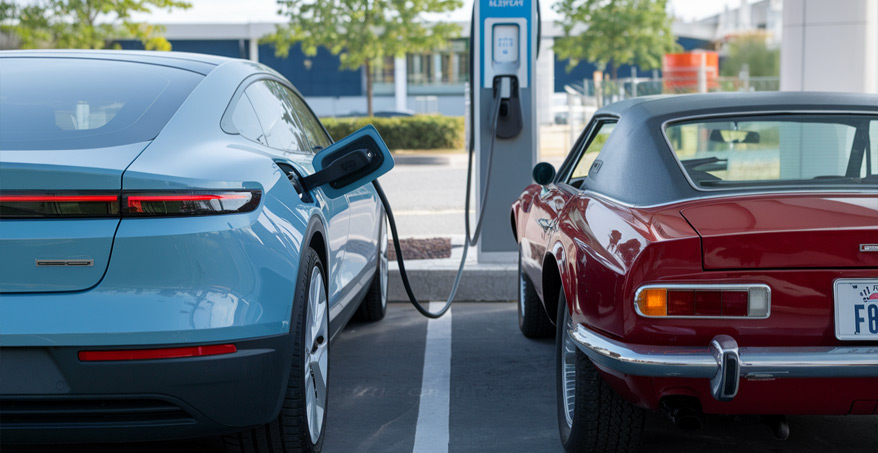Find out which is more economical in the long run: electric or gasoline vehicles.
With the rise of electric vehicles (EVs), many car buyers are curious about how these modern machines compare to traditional gasoline-powered cars in terms of long-term costs. While upfront prices for electric vehicles can be higher, several factors, including fuel savings, maintenance, and tax incentives, play a role in determining which type of vehicle offers better value over time.
Let’s dive into a detailed cost comparison between electric vehicles and gasoline cars to help you make the best financial decision.
-
Upfront Cost: EVs vs Gasoline Cars
One of the primary considerations for any car buyer is the initial purchase price. Electric vehicles generally have higher sticker prices due to the advanced battery technology. For example, a popular EV like the Tesla Model 3 starts at around $40,000, whereas a similar gas-powered sedan like the Honda Accord may begin around $28,000. However, the cost difference is often mitigated by federal and state tax incentives offered to EV buyers. Depending on where you live, you could qualify for EV tax credits of up to $7,500, which can narrow the price gap significantly.
-
Fuel Costs: Electricity vs Gasoline
The most immediate cost advantage of electric vehicles lies in fuel savings. Charging an EV is typically much cheaper than fueling a gasoline-powered vehicle. On average, the cost to drive an electric car 100 miles is about $4.00, compared to around $12.00 for a gasoline car. Over time, this can add up to substantial savings. For instance, if you drive 12,000 miles per year, you could save roughly $900 annually by choosing an electric vehicle over a gas-powered one.
In areas with access to public charging stations or home solar systems, the savings on fueling an EV can be even greater, further improving the long-term cost advantage.
-
Maintenance Costs: Which Vehicle is Cheaper to Maintain?
One of the biggest long-term advantages of electric vehicles is lower maintenance costs. EVs have fewer moving parts than traditional gasoline cars—there’s no engine oil to change, no exhaust system, and fewer components that wear out over time. As a result, regular maintenance like oil changes, spark plug replacements, and emissions checks are unnecessary.
According to a study by Consumer Reports, EV owners can save up to 50% on maintenance over the lifespan of the vehicle. On the other hand, gasoline-powered cars require regular maintenance, including engine tune-ups, transmission services, and brake replacements, all of which add up over time.
-
Longevity and Depreciation: How They Compare
Depreciation is another factor when comparing electric vs gasoline vehicles. In the past, EVs suffered from higher depreciation rates, partly due to concerns over battery longevity and the rapid evolution of EV technology. However, newer electric models, such as those from Tesla and Ford, have shown stronger resale value, and battery technology has improved significantly, with most EV manufacturers now offering warranties of 8 years or more on their batteries.
Gasoline cars, while generally more predictable in terms of depreciation, can also lose value quickly depending on fuel prices and demand for more fuel-efficient alternatives. Overall, EVs are expected to close the gap in depreciation rates as they become more widely adopted and accepted.
-
Charging Infrastructure vs Gas Stations
A common concern with electric vehicles is access to charging stations. While gas stations are abundant and convenient, EV charging networks are expanding rapidly. Companies like Tesla, Electrify America, and EVgo have created extensive charging networks across the U.S. Additionally, many EV owners can charge their vehicles at home, reducing the need for public charging altogether.
Despite this progress, long-distance road trips may still pose a challenge for some EV drivers in areas with limited charging infrastructure. Gasoline-powered cars remain the more convenient choice for drivers who frequently travel far from urban centers.
-
Environmental and Social Impact
While not directly a financial consideration, it’s worth noting that electric vehicles offer significant environmental benefits compared to gasoline cars. EVs produce zero tailpipe emissions, reducing air pollution and contributing to lower greenhouse gas emissions. This environmental advantage could become more financially relevant as governments increasingly incentivize green technology through carbon credits or other financial rewards for eco-friendly behavior.
Which is the Best Long-Term Investment?
When it comes to long-term costs, electric vehicles offer clear advantages in fuel savings, maintenance, and potentially lower depreciation rates. Although gasoline cars may have a lower upfront cost, the total cost of ownership for an EV can be much lower over time. With the added benefit of tax incentives, environmental advantages, and rapidly improving charging infrastructure, electric cars are increasingly becoming a smarter long-term investment.


